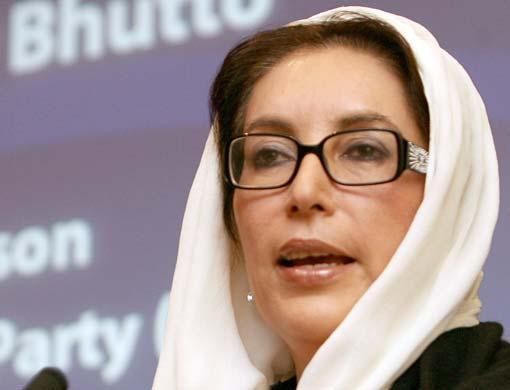Dubai: Former Pakistan prime minister Benazir Bhutto firmly rejected criticism yesterday that the rumoured power-sharing "deal" forged with Pakistan's President Pervez Musharraf during a meeting in Abu Dhabi was engineered to benefit her personally.
Speaking from London where she is holding talks with senior members of her party over allocation of tickets for parliamentary elections later this year, the Pakistan Peoples Party leader clarified for the first time, "if I wanted to do a deal to safeguard my own interests I could have done it a long time ago".
"This is to facilitate a transition to democracy, a free and fair election and a level playing field for all political parties."
Despite senior Pakistani government officials confirming the meeting, she continued to maintain a studied ambivalence on meeting Gen Musharraf for secret talks in Abu Dhabi.
Quid pro quo
She refused to confirm or deny the meeting took place, amid reports it may have resulted in a quid pro quo - the opposition leader agreeing to back Gen Musharraf for another presidential term if he gave up his position as head of the armed forces, and in return, dropping cases against her and agreeing for a constitutional amendment to lift the ban on a third term for a twice serving prime minister. Bhutto held prime ministerial office in 1988-90 and again in 1993-96.
"I am not confirming that the meeting took place or that a deal has been struck," she said, "but I can confirm that we have been engaged in negotiations, that we have been talking to the military regime for some time now".
When asked if she had begun negotiations with Gen Musharraf so that she could return to Pakistan without the Sword of Damocles of arrest over corruption cases hanging over her head if she chose to end her eight years in self exile, Bhutto said "Of course I want to return to Pakistan. Of course I want the politically motivated cases against me to be dropped.
"But if I wanted to do a deal with the military I could have done that a long time ago. I could have accepted the LFO [the Legal Framework Order that legitimised Musharraf's coup in 1998]. I could have had all the charges brought against me dropped as far back as 2000. I could have had my husband out of jail. I need not have faced the persistent persecution by the Sharifs and subsequently the military."
Instead, Bhutto said, she had "stood it out" along with members of her party, many of whom paid a price in beatings, summary arrests and detention and as in the case of her aide Munnawar Suhrawardy, death. "We paid a huge political price by not compromising on our principles."
Negotiations
Bhutto, who signed a "charter for democracy" with ousted prime minister Nawaz Sharif of the Pakistan Muslim League-Nawaz that said neither would have any truck with the military, has been roundly criticised for negotiating with the military leader. She says in her defence that she's not the only one to do so.
"There have been many kinds of deals by different political forces. The PML-N struck a deal over the Sharifs' exile in Saudi Arabia. The ruling parties struck one to legitimise [Gen] Musharraf as president, the third, a deal the government struck with elders in the tribal areas. The discussions with the PPP are of a different nature. It's certainly not about me.
"We have never closed the door to negotiations, we believe we must tap on every door to bring democracy back to Pakistan, because Pakistan is an important country. With the threat of Al Qaida, clearly what happens inside Pakistan affects the world."
But Bhutto's startling comment that negotiations with the military were far from over is certain to fuel speculation, her position is hardening. "To anyone who is saying it's a done deal, let me tell you those conclusions are way too premature. There are a number of issues that remain to be resolved. We insist the elections be free and fair. There is the issue of the uniform. There is the issue of the balance of power, of power sharing between the military and an elected parliament, and of whether there will be a level playing field for all political parties in elections."
TIME FACTOR
'President has to act now'
Ratcheting up the pressure on President Pervez Musharraf, who has remained silent on whether he intends to remain army chief and re-elect himself from the present assemblies, former prime minister Beanzir Bhutto warned that time for him was running out.
"This is the time, the time is now. Decisions have to be made. Presidential, parliamentary and prime ministerial elections are all taking place between October and December."
Her party has filed a reference alleging the voters' list was flawed with almost 30 per cent of the electorate missing and at least 26 per cent being duplicate names.
"Let me be clear. We in the PPP believe that after the major challenge posed by the lawyers‚ movement, the Supreme Court is unlikely to give sanction to the re-election of Musharraf from the present assemblies."
It will be challenged in court. We certainly will not back his re-election as a president in uniform."













